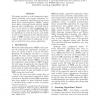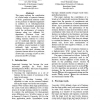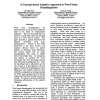54 search results - page 2 / 11 » Boosting Applied to Word Sense Disambiguation |
107
click to vote
CORR
2000
Springer
15 years 1 months ago
2000
Springer
This paper describes a set of comparative experiments, including cross{corpus evaluation, between ve alternative algorithms for supervised Word Sense Disambiguation (WSD), namely ...
119
click to vote
COLING
2002
15 years 1 months ago
2002
This paper explores the contribution of a broad range of syntactic features to WSD: grammatical relations coded as the presence of adjuncts/arguments in isolation or as subcategor...
132
click to vote
COLING
2010
14 years 9 months ago
2010
Active learning has been applied to different NLP tasks, with the aim of limiting the amount of time and cost for human annotation. Most studies on active learning have only simul...
129
Voted
ACL
1998
15 years 3 months ago
1998
Word sense disambiguation for unrestricted text is one of the most difficult tasks in the fields of computational linguistics. The crux of the problem is to discover a model that ...
128
click to vote
CORR
2004
Springer
15 years 1 months ago
2004
Springer
This paper describes the National Research Council (NRC) Word Sense Disambiguation (WSD) system, as applied to the English Lexical Sample (ELS) task in Senseval-3. The NRC system ...



